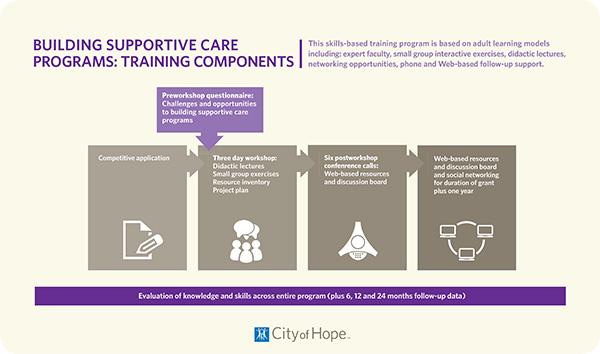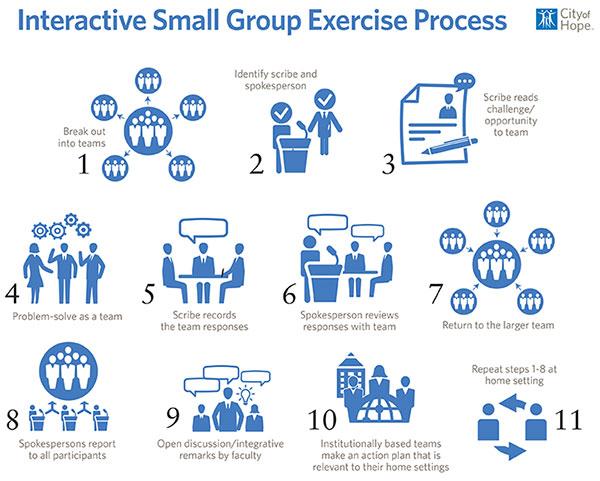Building Supportive Care Training Program
- Learn how to implement, maintain and grow supportive care programs of excellence.
- Attend a three-day workshop, six strategic planning conference calls, a web-based discussion board and tailored resources — all available at no cost to you (all other expenses are the responsibility of the trainee).
- Receive AMA PRA Category 1 Credits.
- Benefit from the experiences of an internationally recognized faculty who have successfully created supportive care programs in a variety of settings.
- Acquire the skills necessary to create the culture change that is essential to transforming health care.
- Learn how to facilitate skills-based small groups focused on opportunities for leadership and culture change.
- Work with other courageous colleagues from around the country to share skills, experiences, successes and setbacks in highly interactive environment.
- Create supportive professional relationships that can last a lifetime.
Faculty for Building Supportive Care Training Program
The workshop will be conducted by internationally recognized leaders: oncologists, pain and palliative care experts, psychiatrists, psychologists, social workers, researchers, nurses and business administrators (partial list only).
• Matthew Loscalzo, L.C.S.W., City of Hope (PI)
• William Redd, Mt. Sinai Medical Center (Site PI)
• Susan Block, Dana Farber Cancer Institute
• Barry Bultz, Tom Baker Cancer Center
• Paul Jacobsen, Moffitt Cancer Center
• Ruth McCorkle, Yale University
• Karen Clark, M.S., City of Hope (Co-Investigator)
• Marcia Grant, D.N.Sc., R.N., City of Hope (Co-Investigator)
• Donald Rosenstein, UNC at Chapel Hill
• Joseph Simone, Simone Consulting
• Lynn Spragens, Spragens & Associates
• Deanne Wolcott, Cedars Sinai Cancer Center
Core Curriculum
The training will address topics identified as critical to building, implementing and evaluating supportive care programs that provide compassionate and effective biopsychosocial care along the disease continuum (partial list only):
- Implementing clinical pathways for identifying and addressing patients’ supportive care needs
- Engaging physicians, nurses and institutional administrative leaders
- Using a sound financial plan to build a clinical program
- Identifying and maximizing institutional and community resources
- Integrating clinical care, research and education
- Initiating institutional culture change

Three-day Workshop
- Implementing clinical pathways for identifying and addressing patients’ supportive care needs
- Engaging physicians, nurses and institutional administrative leaders
- Using a sound financial plan to build a clinical program
- Identifying and maximizing institutional and community resources
- Integrating clinical care, research and education
- Initiating institutional culture change

Postworkshop follow-up opportunities
- Hopeboard - This is an online discussion board to permit networking during the tenure of the award and one year following. The online discussion board is available around the clock and is an easily accessed repository for tailored information, resources, articles and inspiring stories. The discussion board is used to disseminate course curriculum materials, research articles and any other announcements relevant to the workshops. It is also used to collect follow-up information from the trainees.
- Strategic planning conference calls - Monthly training faculty-trainee conference calls are conducted by the PI for six months following each workshop. These conference calls will be run in the same way as the small group interactive exercises were conducted during the workshop. If there are specific issues that are relevant to fewer members of the group, the PI will arrange for separate conference calls to encourage common interest groups, specialized networking and the small interactive group process.